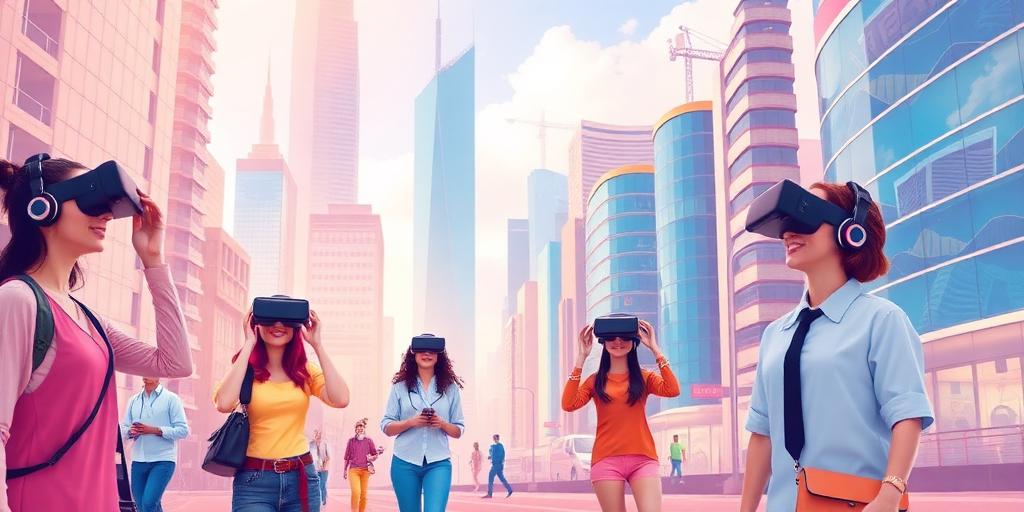Virtual Reality Beyond Gaming: Lifestyle Applications in 2025
Virtual Reality (VR) has long been associated with gaming, but its potential extends far beyond entertainment. By 2025, VR is poised to revolutionize various aspects of our daily lives, offering immersive experiences that transform how we interact with technology and the world around us. This article explores the emerging lifestyle applications of VR, highlighting its impact on different sectors and providing a glimpse into the future.
VR in Healthcare
One of the most promising applications of VR is in healthcare. VR technology is being used for:
- Therapy and Rehabilitation: VR can simulate real-life scenarios to help patients overcome phobias, PTSD, and anxiety disorders. It also assists in physical therapy by providing engaging and interactive exercises.
- Surgical Training: Medical students and surgeons can use VR to practice complex procedures in a safe, risk-free environment, enhancing their skills and preparedness.
- Pain Management: VR experiences can distract patients from pain during medical procedures or chronic conditions, reducing the need for medication.
VR in Education
VR is set to transform education by creating immersive learning environments. Students can:
- Virtual Field Trips: Explore historical sites, museums, and natural wonders from the classroom, making learning more engaging and memorable.
- Interactive Lessons: Interact with 3D models of complex concepts, such as the human body or the solar system, to gain a deeper understanding.
- Skill Development: Practice real-world skills, such as public speaking or conducting experiments, in a simulated environment.
VR in Retail and Commerce
VR is enhancing the shopping experience and transforming how consumers interact with products.
- Virtual Showrooms: Customers can explore virtual showrooms to view products in a realistic setting before making a purchase. This is particularly useful for furniture, real estate, and automobiles.
- Try-On Experiences: VR allows customers to virtually try on clothing, accessories, and makeup, improving the online shopping experience and reducing returns.
- Personalized Shopping: VR can analyze customer preferences and provide personalized product recommendations in an immersive environment.
VR in Travel and Tourism
VR offers new ways to explore destinations and plan travel experiences.
- Virtual Tours: Potential travelers can take virtual tours of hotels, resorts, and tourist attractions to make informed decisions.
- Immersive Experiences: VR can recreate historical events or cultural experiences, allowing users to immerse themselves in different time periods and cultures.
- Accessibility: VR can make travel accessible to individuals with disabilities or those who cannot travel due to financial or logistical constraints.
VR in Real Estate
VR is revolutionizing the real estate industry by providing immersive property tours and design experiences.
- Virtual Property Tours: Potential buyers can tour properties remotely, exploring every room and angle as if they were physically present.
- Customization and Design: VR allows buyers to customize the interior design of a property, experimenting with different layouts, furniture, and décor before making a purchase.
- Remote Collaboration: Architects, designers, and clients can collaborate on projects in a shared virtual space, streamlining the design process.
Challenges and Future Outlook
While VR offers numerous benefits, several challenges must be addressed to ensure its widespread adoption:
- Cost: VR headsets and equipment can be expensive, limiting accessibility for some consumers.
- Technology: Ongoing advancements in technology are needed to improve the resolution, comfort, and user experience of VR devices.
- Content: The availability of high-quality VR content needs to increase to meet the growing demand across different sectors.
By 2025, VR is expected to become an integral part of our daily lives, transforming how we learn, work, shop, and interact with the world. As technology continues to evolve and costs decrease, VR’s lifestyle applications will become more accessible and widespread, unlocking new opportunities and experiences for individuals and businesses alike.
